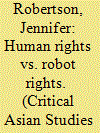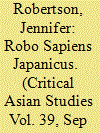| Srl | Item |
| 1 |
ID:
098399


|
|
|
|
|
| Publication |
2010.
|
| Summary/Abstract |
What has distinguished anthropology from the other social sciences is an immersion in sustained fieldwork, itself premised on different kinds and levels of lived and shared experiences, usually with hitherto strangers in another culture in an often distant geographical location. In 2005 the U.S. Department of Defense inaugurated the experimental Human Terrain System, which embeds social scientists with combat brigades to enhance "operational effectiveness" and, supposedly, to reduce civilian casualties. A consensus is emerging among concerned anthropologists that ethnographic fieldwork abroad and within a broad spectrum of military activities and actors can, and must, be employed to challenge the U.S. Army's alarmingly naive concept of "weaponizing culture." The constituent essays in this thematic collection on the vicissitudes of the relationship between war and anthropology take up and complicate the premises of this challenge.
|
|
|
|
|
|
|
|
|
|
|
|
|
|
|
|
| 2 |
ID:
134602


|
|
|
|
|
| Summary/Abstract |
Japan continues to be in the vanguard of human–robot communication and, since 2007, the state has actively promoted the virtues of a robot-dependent society and lifestyle. Nationwide surveys suggest that Japanese citizens are more comfortable sharing living and working environments with robots than with foreign caretakers and migrant workers. As their population continues to shrink and age faster than in other postindustrial nation-states, Japanese are banking on the robotics industry to reinvigorate the economy and to preserve the country's alleged ethnic homogeneity. These initiatives are paralleled by a growing support among some roboticists and politicians to confer citizenship on robots. The Japanese state has a problematic record on human rights, especially toward ethnic minorities and non-Japanese residents who have lived and worked in Japan for many generations. The possibility of robots acquiring civil status ahead of flesh-and-blood humans raises profound questions about the nature of citizenship and human rights. Already the idea of robots having evolved beyond consideration as “property” and acquiring legal status as sentient beings with “rights” is shaping developments in artificial intelligence and robotics outside of Japan, including in the United States. What does the pursuit in Japan of interdependence between humans and robots forecast about new approaches to and configurations of civil society and attendant rights there and in other technologically advanced postindustrial societies?
|
|
|
|
|
|
|
|
|
|
|
|
|
|
|
|
| 3 |
ID:
079844


|
|
|
|
|
| Publication |
2007.
|
| Summary/Abstract |
Japan accounts for nearly 52 percent of the world's share of operational robots and leads the postindustrial world in the development of humanoid robots designed and marketed specifically to enhance and augment human society. Innovation 25, Prime Minister Abe's visionary blueprint for remaking Japanese society by 2025, with the aim of reversing the declining birthrate and accommodating the rapidly aging population, emphasizes the central role that household robots will play in stabilizing core institutions, like the family. In addition to exploring the cultural logic behind the development of autonomous, intelligent, evolutionary humanoid robots, I argue that new bio-and robot technologies are being deployed to reify old or "traditional" values, such as the patriarchal extended family and sociopolitical conservatism.
|
|
|
|
|
|
|
|
|
|
|
|
|
|
|
|